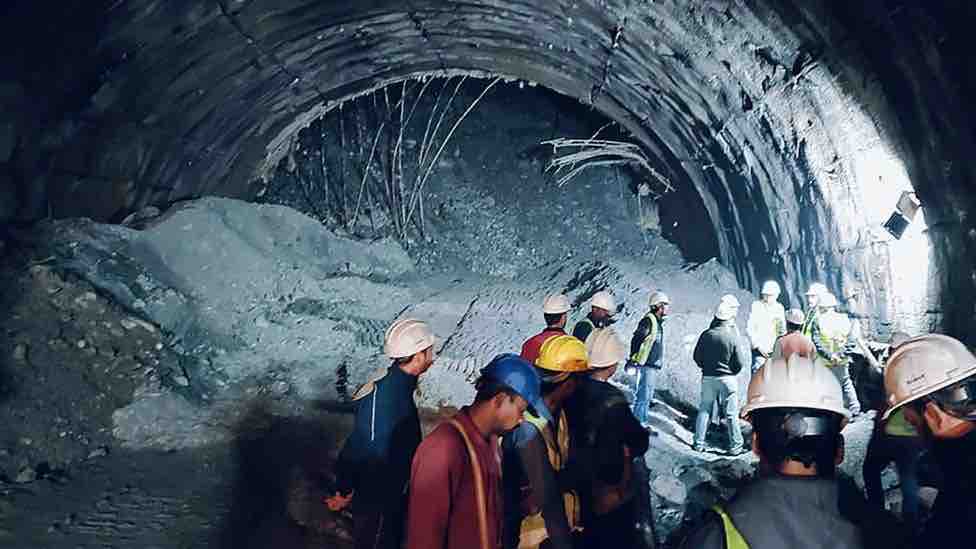Uttarkashi Tunnel Collapse Trapping 41 Workers Is A Result of Criminal Negligence

More than 200 hours have passed since 41 workers were trapped hundreds of feet below the surface following a part of under-construction Silkyara-Barkot tunnel in Uttarakhand’s Uttarkashi district collapsed on November 12. The 4.5 km long planned tunnel is part of the controversial Rs. 1200 crore Char Dham Highway project in the fragile Himalayan region.
Expressing serious concern in delay in the rescue operation, Indresh Maikuri, Uttarakhand state secretary of CPIML said despite warnings by experts regarding the adverse impact of the entire project on the stability of landslide and earthquake prone region, the Prime Minister and BJP led central and state governments pushed ahead with the construction.
“The National Highways & Infrastructure Development Corporation Limited (NHIDCL), the implementing agency of the project and Navayuga Engineering Company Limited, which was constructing the tunnel are responsible for endangering the lives of workers by flouting safety norms,” added Com. Indresh. “The incident is clearly a case of criminal negligence that completely disregarded the scientific and safety norms.”
The standard operating procedure mandates that all tunnels over 3 km long are supposed to have an escape route to rescue people in case there is an emergency. According to various news reports, the reinforced hume pipes used for emergency escape route were removed by the company just a few months before the incident. Furthermore, workers employed in the project were not insured and nor were they registered with the labour department.
When BJP leader and Minister of Road Transport and Highways of India Nitin Gadkari was asked by the journalists about the lack of escape mechanism in the tunnel, he refused to answer the question. It’s a matter of grave concern that while the government has given crores of rupees for the project, it seems that no attention has been paid towards the disaster management.
Even after the collapse, the carelessness by the company didn’t end. The initial report by the company said that 40 workers were trapped, and a few days later the number increased to 41, showing complete lack of proper management by the company. Majority of the labourers are migrant workers from 7 different states including Jharkhand, Uttar Pradesh, Odisha, Bihar, West Bengal, Assam and Himachal Pradesh.
This is not the first case of negligence by NHIDCL and various construction companies contracted under PM Modi’s ambitious Char Dham project. On 21 December 2018, seven workers, from Baramulla district of Jammu & Kashmir were killed by a landslide that took place in Banswara area on the Rudraprayag-Gaurikund stretch of the under-construction ‘all weather road’. In the investigation by the authorities, it was found that the company contracted for the work was carrying out the construction without following the basic safety standards for the workers.
Incidentally, about a week before the Rudraprayag landslide incident, the District Magistrate has also found significant negligence and substandard work being carried out by the contracted company in cutting the hill slopes. In another incident in July 2020, a retaining wall constructed by the company collapsed in Kheda village of Narendranagar in which three children were killed.
Atul Sati, state committee member of CPIML and Convenor of Joshimath Bachao Sangharsh Samiti said that the Silkyara-Barkot tunnel collapse is not the first incident that has exposed the adverse impact of unabated and unplanned constructions in the region. The recent land subsidence in Joshimath, a town roughly 190 kms from Silkyara has already highlighted the signs of an impending disaster in the region, that is increasingly witnessing unplanned heavy constructions and burrowing and cutting of the hills. In Joshimath, already several hundred houses have been damaged and many people are left homeless.
Experts had warned against the ‘all weather highway’ project, which involved doubling the width of the existing roads and cutting and running through the hills. Despite the warnings, including from some members of the Supreme Court appointed High Powered Committee (HPC), the government went ahead with the project under the grab of defence requirement.
Furthermore, to evade the requirement of Environmental Impact Assessment (EIA), the government divided the entire 899 km long highway plan into 53 individual projects of less than 100 km each.
The Supreme Court, while approving the project had directed the authorities to employ available engineering and scientific practices during the execution of project, but the project has been marred by substandard work and unscientific practices. During the 2023 floods in Uttarakhand, several parts of the ‘all weather highway’ were completely washed away.
“The double engine government of BJP is playing with the lives of the workers engaged in these projects and the local population in the region by ignoring the warnings of the experts,” added Atul Sati.
Charu Bhawan, U-90, Shakarpur, Delhi 110092
Phone: +91-11-42785864 | +91 9717274961 E-mail: info@cpiml.org

